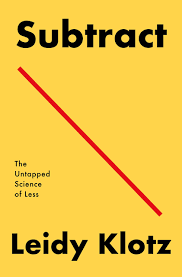Book Review: Subtract
Published:
Subtract by Leidy Klotz argues that we overlook subtraction to our detriment. In a story that spans from the laboratory to racism and climate change, Klotz diagnoses the causes of and solutions to subtraction neglect.

Here’s the paperback and audiobook.
Utility: ⭐⭐ (2/5)
The core laboratory research is interesting. There does seem to be some innate preference for adding things, which might inform small-scale, everyday decisions. But Klotz overextends when applying his research to public policy problems. Our preference for keeping a bridge, for example, is perfectly explained by the endowment effect. Reframing it as neglecting subtraction is unintuitive and unhelpful.
Writing: ⭐⭐ (2/5)
Ironically, Klotz’ writing suffers from subtraction neglect. The book moves along at a slow pace, often repeating itself or drawing out points too far. After the first chapter, everything is predictable and unconvincing—not the best reading experience.
Notes
Experimental Evidence
Leidy worked with Ben, a psychologist, and Andy, a post-doc, to design and conduct a series of experiments. After several years of studies with props ranging from LEGOS to vacation itineraries, the team concluded that subtracted neglect was real.
Causes
Our bias for adding has multifaceted roots:
- Biology: Animals often build structures as a form of signaling. Their nest, for example, is a sign of strength and skill to potential mates. Subtraction isn’t very helpful for signaling. Resource scarcity also drives us to accumulate, with stockpiling behavior observed in birds and mammals. Children also seem to be better at addition than subtraction, often because subtraction occurs from larger quantities.
- Culture: Humans have an innate instinct to build monuments. New archeological evidence suggests that civilizations formed after the creation of large, central structures. In modern day, the social status associated with having more and the assymetric benefits of having more information both favor addition. Cultural differences may play a role too, as Westerners tend to focus on the object instead of the field (e.g. the fish instead of the water). And, people face expectations to do more, particularly in the workplace.
- Political Economy: People are rewarded economically for more. Consider the value of a home, which only goes up when a renovation adds space. No one would pay for a renovation that subtracted floor space from the property. A similar story is true for politics. People fight to add bills, which is why America’s regulatory system has so much bloat.
Solutions
One of the key challenges is to make less noticeable. A good example is Bruce Springsteen album Darkness, which he describes as his “samurai record, all stripped down for fighting.” The wording matters - people prefer “clean” or “streamline” over “delete” and “remove.”
Some real world contexts:
- Racism: Boycotts are some of the most effective strategies, as exemplified by divestment from South Africa.
- Practice: Imposing constraints helps you train, e.g. redoing debate speeches with less time.
- Climate change: Policymakers are too focused on GDP and are biased against removing emissions at the expense of growth. Separately, there’s a need to focus on the most effective climate policies only.
- Information overload: The world has too much information. Focusing on the important content can be more effective for learning and personally rewarding.
